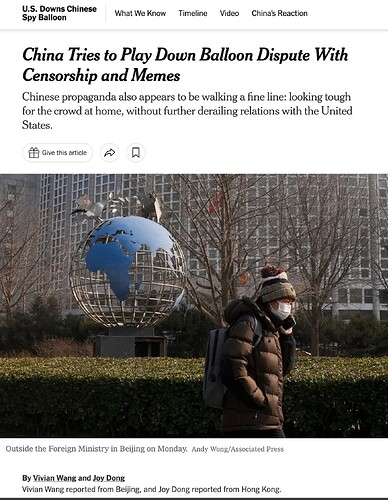-
中国当局一直在利用社交媒体和宣传机器来淡化在关岛沿海发现疑似间谍气球的事件。
-
中国社交媒体上的人们拿这个气球开玩笑,把它比作元宵节的庆祝活动和一种传统食物。
-
中国政府正试图限制对这一事件的新闻报道,并控制国内的讨论,以避免国际和国内的头痛问题。
-
中国政府在试图重新进入全球舞台的同时需要显得强大。
-
近年来,反美情绪高涨,气球事件引起了外交上的骚动。
-
国务卿安东尼-布林肯对北京的访问已被无限期推迟。
-
中国政府可能希望通过允许幽默的回应来安抚国内情绪,从而将进一步的损害降到最低。
-
中国领导人正在努力平衡他们的不同利益。
-
中国正以低调的方式处理最近在北美南美上空发现的两艘迷途的中国飞艇,以避免国内可能出现的尴尬问题。
-
中国官员和国家媒体在很大程度上回避了对这一事件的报道。
-
与最近其他美中关系紧张的案例相比,几乎没有类似官方活动的迹象。
-
中国正在避免像去年8月南希-佩洛西访问台湾时那样挑起民族主义情绪和谩骂。
-
“恰好其中一个不小心触发了美国军方的警报。”
-
最近几天,关于气球事件的各种标签在中国的社交媒体平台–微博上流行起来。
-
许多中国人以幽默的方式回应这一事件,创造了一些备忘录,并将气球比作流行电影 “流浪地球2”。
-
What’s on Weibo的编辑Manya Koetse认为,这种轻松的反应可能是由于Covid限制的结束和农历新年假期,以及《流浪地球》电影的流行。
-
许多网上的笑话是嘲讽而又自信的,暗示中国是故意发射气球,而不是意外。
-
最近涉及中国气球引发美国军方警报的事件,引起了中国社交媒体用户的轻松回应。在微博,一个类似中国推特的平台上,与该气球有关的各种标签已经成为热门话题。许多中国人没有表示惊慌,而是用备忘录和笑话来回应,把气球比作流行电影《流浪地球2》。这种轻松的反应可能是由于Covid限制和农历新年的结束,以及《流浪地球》电影的成功。许多网上的笑话是嘲讽的,但又是自信的,表明中国是故意发射气球的,而不是意外。这种幽默的反应可能是中国国家信心增强的一个标志。
-
美国战斗机击落了一个中国拥有的气象气球,这在中国社交媒体上引发了关于这一事件的讨论。
-
中国互联网受到严格审查,政府致力于引导舆论,因此#流浪气球#标签和另一个关于中国在拉丁美洲上空的第二个气球的标签都被审查了。
-
尽管有审查,但一些评论者对官方的说法表示怀疑,并提供了一些政治分析,其中主要指责美国夸大这一事件,以便在未来的谈判中获得优势。
-
总的来说,中国社交媒体上的对话在很大程度上是由政府引导的,而对美中关系的潜在损害的认真分析相对较少。
-
中国已经撤下了指责美国政府试图制造新冷战的帖子,很可能是为了与美国保持更好的关系。
-
北京也可能试图让这个问题淡化,因为这次任务,不管是天气数据还是间谍活动,都是失败的,政府鼓励人们把对中国错误行为的指责看作是捏造的。
-
即使如此,热气球事件还是引起了一些混乱,在国家媒体的微博下,有一条最受欢迎的评论是:“原来真的是来自我们国家…”
-
Chinese authorities have been using social media and propaganda apparatus to downplay an incident in which a suspected spy balloon was found off the coast of Guam.
-
People on Chinese social media joked about the balloon, comparing it to a Lantern Festival celebration and a traditional food.
-
The Chinese government is attempting to limit news coverage of the incident and to control discussion at home, in order to avoid an international and domestic headache.
-
Chinese government needs to look strong while trying to re-enter the global stage.
-
Anti-American sentiment has risen in recent years and the balloon incident has caused a diplomatic uproar.
-
Secretary of State Antony J. Blinken’s visit to Beijing has been postponed indefinitely.
-
Chinese government may be looking to minimize further damage by allowing humorous responses to mollify domestic sentiment.
-
Chinese leadership is trying to balance their different interests.
-
China is using a low-key approach to the recent admission of two wayward Chinese airships over Colombia to avoid potentially awkward questions at home.
-
Chinese officials and state media have largely steered away from covering the saga.
-
Compared to other recent cases of U.S.-China tension, there is little sign of a similar official campaign.
-
China is avoiding stirring up nationalist sentiment and vitriol as it did in the case of Nancy Pelosi’s visit to Taiwan last August.
-
“It just so happened that one of them accidentally triggered an alarm in the U.S. military.”
-
In recent days, various hashtags about the balloon incident have been trending on Weibo, a Chinese social media platform.
-
Many Chinese have responded to the incident with humor, creating memes and comparing the balloon to the popular movie “The Wandering Earth 2.”
-
Manya Koetse, the editor of What’s on Weibo, believes the lighthearted response may be due to the end of Covid restrictions and the Lunar New Year holiday, along with the popularity of “The Wandering Earth” film.
-
Many online jokes were mocking yet confident, suggesting that China had launched the balloon on purpose rather than by accident.
-
The recent incident involving a Chinese balloon triggering an alarm in the U.S. military has elicited a lighthearted response from Chinese social media users. On Weibo, a Chinese Twitter-like platform, various hashtags related to the balloon have become trending topics. Rather than expressing alarm, many Chinese have responded with memes and jokes, comparing the balloon to the popular movie “The Wandering Earth 2.” The lighthearted response may be due to the end of Covid restrictions and the Lunar New Year, along with the success of “The Wandering Earth” film. Many online jokes were mocking yet confident, suggesting that China had launched the balloon on purpose rather than by accident. This humorous response may be a sign of increased national confidence in China.
-
The U.S. fighter jet shot down a Chinese-owned weather balloon, which sparked a conversation on Chinese social media about the incident.
-
Chinese internet is heavily censored and the government works to guide public opinion, so the #WanderingBalloon hashtag and another hashtag about the second Chinese balloon over Latin America were both censored.
-
Despite the censorship, some commenters expressed skepticism about the official story and some political analysis was offered, which largely blamed the United States for hyping the incident to gain an edge in future negotiations.
-
Overall, the conversation on Chinese social media was largely steered by the government, and there was relatively little serious analysis about the potential damage to U.S.-China relations.
-
China has taken down posts that accused the U.S. government of trying to create a new Cold War, likely in an effort to maintain a better relationship with the U.S.
-
Beijing may also be trying to allow the issue to fade as the mission, whether for weather data or spying, was botched and the government has encouraged people to see accusations of Chinese wrongdoing as fabricated.
-
Even with this, the balloon incident prompted some disorientation with one of the most liked comments under a state media Weibo post reading “So it really is from our country…”
链接:China Tries to Play Down Balloon Dispute With Censorship and Memes - The New York Times
